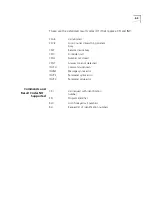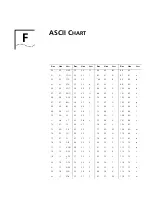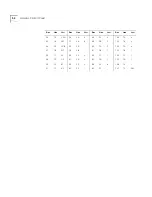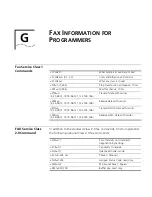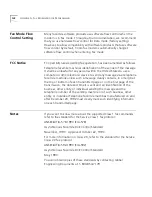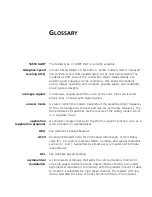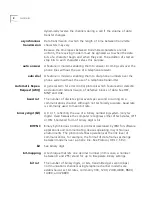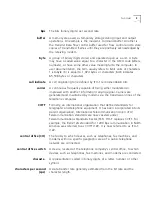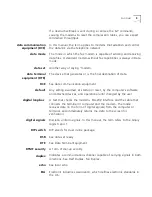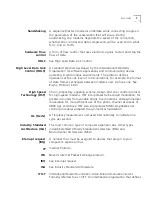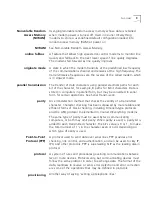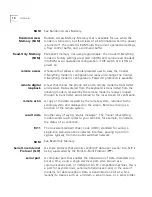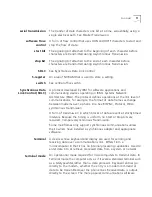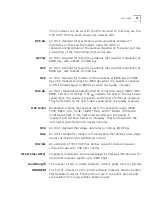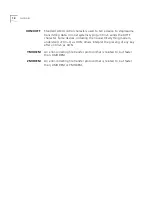
G
LOSSARY
9
Nonvolatile Random
Access Memory
(NVRAM)
User-programmable random access memory whose data is retained
when modem power is turned off. Used in Courier V.Everything
modems to store a user-defined default configuration loaded into
random access memory (RAM) at power on
NVRAM
See Non-volatile Random Access Memory.
online fallbac
A feature that allows high speed error-control modems to monitor line
quality and fall back to the next lower speed if line quality degrades.
The modems fall forward as line quality improves.
originate mode
A state in which the modem transmits at the predefined low frequency
of the communications channel and receives at the high frequency. The
transmit/receive frequencies are the reverse of the called modem which
is in Answer mode.
parallel transmission
The transfer of data characters using parallel electrical paths for each
bit of the character, for example, 8 paths for 8-bit characters. Data is
stored in computers in parallel form, but may be converted to serial
form for certain operations. See Serial Transmission
parity
An error-detection method that checks the validity of a transmitted
character. Character checking has been surpassed by more reliable and
efficient forms of block-checking, including Xmodem-type protocols
and the ARQ protocol implemented in Courier V.Everything modems.
The same type of parity must be used by two communicating
computers, or both may omit parity. When parity is used, a parity bit is
added to each transmitted character. The bit's value is 0 or 1, to make
the total number of 1's in the character even or odd, depending on
which type of parity is used.
Point-to-Point
Protocol (PPP)
A protocol used to send data over serial lines. PPP provides error
checking, link control, and authentication, and can be used to carry IP,
IPX, and other protocols. PPP is superseding SLIP as the leading dial-in
protocol.
protocol
A system of rules and procedures governing communications betwee
two or more devices. Protocols vary, but communicating devices must
follow the same protocol in order to exchange data. The format of the
data, readiness to receive or send, error detection and error correction
are some of the operations that may be defined in protocols.
provisioning
Another way of saying "setting up telephone lines."
Summary of Contents for Courier
Page 12: ......
Page 28: ...1 14 CHAPTER 1 CONNECTING TO YOUR ISP ...
Page 36: ...3 4 CHAPTER 3 UPGRADING YOUR MODEM ...
Page 58: ...6 6 CHAPTER 6 WORKING WITH MEMORY ...
Page 64: ...8 4 CHAPTER 8 CONTROLLING EIA 232 SIGNALING ...
Page 72: ...9 8 CHAPTER 9 ACCESSING AND CONFIGURING THE COURIER V EVERYTHING MODEM REMOTELY ...
Page 80: ...10 8 CHAPTER 10 CONTROLLING DATA RATES ...
Page 96: ...12 6 CHAPTER 12 FLOW CONTROL ...
Page 108: ...13 12 CHAPTER 13 HANDSHAKING ERROR CONTROL DATA COMPRESSION AND THROUGHPUT ...
Page 112: ...14 4 CHAPTER 14 DISPLAYING QUERYING AND HELP SCREENS ...
Page 122: ...15 10 CHAPTER 15 TESTING THE CONNECTION ...
Page 142: ...17 8 CHAPTER 17 TROUBLESHOOTING ...
Page 156: ...A 14 APPENDIX A S REGISTERS ...
Page 172: ...B 16 APPENDIX B ALPHABETIC COMMAND SUMMARY ...
Page 178: ...C 6 APPENDIX C FLOW CONTROL TEMPLATE ...
Page 186: ...E 4 APPENDIX E V 25 BIS REFERENCE ...

